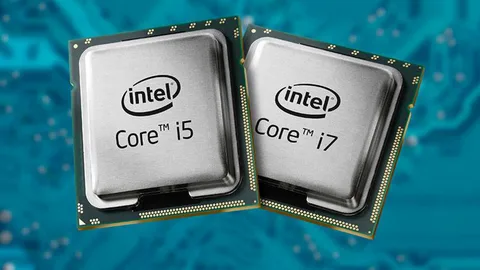
You might have seen laptops or computers that say they have an i5 or i7 processor. But what do these names mean? And more importantly, which one is better for you? These are smart questions.
The simple answer is: both are good, but they do different things. If you play games, make videos, or run big programs, you might like i7 more. If you use your computer to browse the internet, type papers, or watch videos, i5 can work just fine.
So, how do you choose between them? Let’s look at 10 simple points that show how each processor works and which one fits your needs better. Keep reading. This guide is made just for you.
1. What Do i5 and i7 Really Mean?
Intel manufactures both i5 and i7 processors. These are types of microprocessors. The i7 is capable of doing more than the i5. This means it can perform tasks in a multitasking mode and at a much faster speed.
Now, talking about the comparison of i7 vs i5 processors, one has to understand the requirements of the computer. The i7 is considered great for heavy tasks, mainly gaming and video editing, while the i5 is better off with simple ones like web browsing, schoolwork, etc.
But that doesn’t mean the i5 is bad. It means that this product is designed for people who do not require all that extra speed. It carries well for light use. When you need plenty of power for work or play, the i7 is ready-made for you.
2. Speed and Performance
The i7 is faster. That means it opens programs quicker and runs games smoother. It also works better if you open many apps at once.
Here are five ways the i7 is better with speed:
- Loads large files more quickly
- Handles games with higher graphics
- Runs video editing tools faster
- Opens apps faster
- Works better when multitasking
If you don’t do heavy tasks, the i5 speed is still good. It can open emails, browse the web, and play videos without any problem. But for more power, the i7 wins this round.
3. Everyday Use
If you use your computer for simple things, the i5 might be perfect for you. It works great for browsing, typing, and watching shows. You save money and still get good performance.
The i7 helps more if you do a lot at the same time. It can run games, edit videos, and open big files without slowing down. For basic tasks, both are fine. For more advanced stuff, go with an i7.
4. Gaming Power
Gamers need supercharged processors to power their games. That’s what the i7 does. It maximizes graphics and doesn’t freeze when the game gets intense. That’s why many gamers compare the i7 processor vs i5 when choosing a gaming setup.
Still, the i5 is good for many games too. If the game is not too big or new, i5 can play it well. But for the ultimate gaming experience, the i7 is better. It’s quicker in loading, plays better, and does not slow down at all when action heats up.
5. Handling Many Tasks at Once
What Makes a Processor Good at Multitasking?
The number of cores and threads helps a lot. The i7 usually has more, so it can do more things at once.
How Does i7 Help?
When you open many apps, the i7 doesn’t slow down. It handles all the apps smoothly without freezing.
What about i5?
i5 can also multitask, but not as smoothly as i7. You might notice it slows down if you open too many apps.
6. Battery Life
The i5 often uses less power. That means the battery lasts longer on i5 laptops. If you move around a lot or travel, you may like i5 more.
The i7 gives more power but uses more battery. If your laptop stays plugged in, the i7 is fine. If you want your battery to last longer, i5 is the winner.
7. Cost and Budget
The i7 is more expensive. It has more features and runs faster. So, you pay more for the extra power.
Here are five things to think about when buying:
- How much do you want to spend?
- Do you play games or edit videos?
- Will you keep your laptop for many years?
- Do you need power or just basic use?
- Is saving money more important than speed?
If you just want something for school or work, the i5 is a smart buy. If you want something strong and fast, go for an i7.
8. For School or Work
For school tasks like typing, researching, or using online tools, the i5 works great. It can run Google Docs, Zoom, and other learning apps without a problem.
For work, it depends on the job. If you only check emails and join video calls, i5 is enough. But if you design things, edit videos, or work with big programs, then i7 is the better choice.
9. Creative Work and Media Projects
Why Creators Choose i7
People who edit videos or design things pick an i7. It helps them finish work faster. It also keeps the programs running without stopping.
Can i5 Handle Creative Work?
It can, but it’s slower. If you’re just starting or doing small projects, i5 is okay. But it won’t be as fast or smooth as the i7.
Which One Is Better for You?
If you create content often, i7 is the way to go. If not, i5 is good enough and saves you money.
10. Final Thoughts: Which One Powers You Better?
The answer depends on what you do. If you use your computer for light work, school, or daily tasks, then i5 is all you need. It gives good speed and saves you money too.
But if you need more power, love playing games, or work on big creative projects, then i7 is better. It’s faster, stronger, and works well with many apps open. So, think about what you do the most and pick the one that fits your needs.
Conclusion
When you consider your demands, selecting between the i5 and i7 is not difficult. For general use, office jobs, and students, the i5 is ideal. It saves you money and battery life while providing good performance.
Video editors, gamers, and anyone else who needs extra speed will love the i7. More power comes at a higher cost. Therefore, consider whether you require fast speed or basic performance. Do you use your computer frequently or infrequently?
You can make the best decision by providing answers to these questions. Both CPUs are powerful and useful, regardless of whether you choose the i5 or i7. Simply select the one that best suits your needs.






